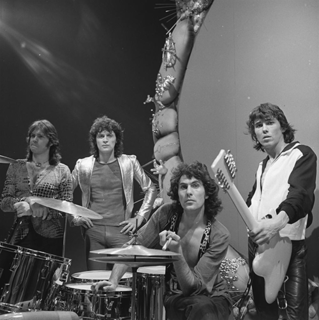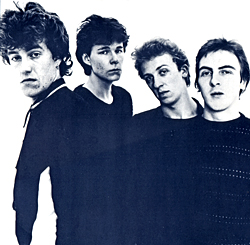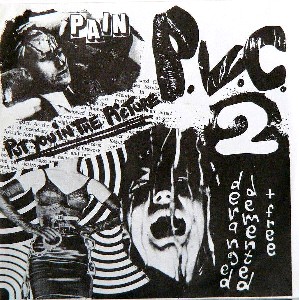
Golden Earring was a Dutch rock band, founded in 1961 in The Hague as The Golden Earrings. They achieved worldwide fame with their international hit songs "Radar Love" in 1973, which went to number one on the Dutch charts, reached the top ten in the United Kingdom, and went to number thirteen on the United States charts, "Twilight Zone" in 1982, and "When the Lady Smiles" in 1984. During their career they had nearly 30 top-ten singles on the Dutch charts and released 25 studio albums.

The Average White Band are a Scottish funk and R&B band that had a series of soul and disco hits between 1974 and 1980. They are best known for their million-selling instrumental track "Pick Up the Pieces", and their albums AWB and Cut the Cake. The band name was initially proposed by Bonnie Bramlett. They have influenced others, such as the Brand New Heavies, and been sampled by various musicians, including the Beastie Boys, Public Enemy, TLC, The Beatnuts, Too Short, Ice Cube, Eric B. & Rakim, Nas, A Tribe Called Quest, Leena Conquest, Christina Milian, and Arrested Development, making them the 15th most sampled act in history. As of 2022, 50 years after their formation, they continue to perform.

Magazine were an English rock band formed in 1977 in Manchester in England by singer Howard Devoto and guitarist John McGeoch. After leaving the punk group Buzzcocks in early 1977, Devoto decided to create a more progressive and less "traditional" rock band. The original lineup of Magazine was composed by Devoto, McGeoch, Barry Adamson on bass, Dave Formula on Keyboards and Martin Jackson on drums. Their debut album Real Life (1978) was critically acclaimed and was one of the first post-punk albums. After releasing two other albums Secondhand Daylight and The Correct Use of Soap, McGeoch left the band in 1980 to join Siouxsie and the Banshees. Magazine released another studio album and disbanded in 1981.

Sham 69 are an English punk rock band that formed in Hersham in Surrey in 1975. They were one of the most successful punk bands in the United Kingdom, achieving five top 20 singles, including "If the Kids Are United" and "Hurry Up Harry". The group's popularity saw them perform on the BBC’s Top of the Pops, and they appeared in the rockumentary film, D.O.A.. The original unit broke up in 1979, with frontman Jimmy Pursey moving on to pursue a solo career.
Orange Juice was a Scottish jangle pop band founded in the Glasgow suburb of Bearsden as the Nu-Sonics in 1976. They became Orange Juice in 1979, and became perhaps the most important band in the Scottish independent music scene that emerged in the post-punk era, inspired by contemporary punk bands including Subway Sect, Television, and Buzzcocks but also 1960s acts, most notably The Byrds and The Velvet Underground. Musically, the band brought together styles and genres that often appeared incongruous, for example, country, disco and punk.

The Motors were a British pub rock band formed in London in 1977 by former Ducks Deluxe members Nick Garvey and Andy McMaster together with guitarist Rob Hendry and drummer Ricky Slaughter. Their biggest success was with the McMaster-penned song "Airport", a number 4 UK hit single in 1978.
Josef K were a Scottish post-punk band, active between 1979 and 1982, who released singles on the Postcard Records label. The band was named after the protagonist of Franz Kafka's novel The Trial. Although they released just one album while together and achieved only moderate success, they have since proved influential on many bands that followed.

Skids are a British punk rock and new wave band, formed in Dunfermline in 1977 by Stuart Adamson, William Simpson, Thomas Kellichan (drums) and Richard Jobson. Their biggest successes were the 1979 single "Into the Valley" and the 1980 album The Absolute Game. In 2016, the band announced a 40th-anniversary tour of the UK with their original singer Richard Jobson.

Vixen is an American rock band formed in Saint Paul, Minnesota, in 1980. During its most commercially successful period from 1987 to 1992, the band consisted of Jan Kuehnemund, Janet Gardner, Share Ross, and Roxy Petrucci (drums).
Abrasive Wheels are a punk rock band of the late 1970s – early 1980s. They hailed from Leeds, England and were seldom out of the Independent charts between 1980 and 1984 when the band split. The band were Shonna Rzonca – vocals, Dave Ryan – guitar, Harry Harrison – bass, Nev Nevison – drums. In 2002 the singer Rzonca reformed the band with new members.

The Photos were an English new wave band fronted by Wendy Wu, who had a top 5 album in the UK Albums Chart in 1980.

Ashton, Gardner and Dyke were a British rock trio, most popular in the early 1970s. They are best remembered for their song, "Resurrection Shuffle", a transatlantic Top 40 one-hit wonder in 1971.
Endgames were a Scottish pop band active during the 1980s. They released two albums on Virgin Records, but failed to achieve significant commercial success.

Barrabás are a Spanish musical group, most successful in the 1970s and 1980s when they were led by drummer and producer Fernando Arbex. The group's musical style was initially Latin rock with jazz and funk influences, and later developed into a more disco-orientated sound.
Russell Webb is a Scottish new wave bass guitarist who was member of bands such as Slik, PVC2, Zones, Skids, The Armoury Show and Public Image Ltd and collaborated with Richard Jobson, Virginia Astley and The Who.
Zones were a Scottish power pop and new wave band founded in late 1977, following the demise of PVC2.

"Put You in the Picture" is a song written by Russell Webb, and performed by his group PVC2, who comprised Ure on guitar and lead vocals, Kenny Hyslop on drums, Billy McIsaac on keyboards and Webb on bass guitar. The song was released on 30 August 1977 by Zoom Records, in an eponymous EP, which was the last single and recording of Midge Ure with the remaining members of Slik, who later resurged as Zones, with another singer and guitarist, Willie Gardner.
Billy McIsaac is a musician, who played mainly keyboards since his early days with different pop bands.
Alastair Riddell is a New Zealand singer-songwriter.










